In OXYGEN 6.5, we have introduced enhanced and updated functions for this intuitive measurement software. This time, we mainly focus on the new power group properties and the possibility of calculating the autocorrelation and cross-correlation of signals. In addition, we also add a signal processing algorithm for acoustic and vibration analysis.
In addition to these major updates, many improvements and bug fixes have been implemented to improve the operating experience.
New Power Bank Features
We have implemented two new Power Group functions:
Standby synchronization channel
Adaptability of rolling calculation
Standby synchronization channel
Some people may say that the "standby synchronization channel" is the backup channel. If the basic frequency cannot be detected on the default synchronous channel, the standby channel is used. This is very useful when the current signal is used for fundamental frequency detection.
Adaptability of rolling calculation
This function allows you to freely define and adjust the update rate and window length of rolling calculation.
Auto -&Cross correlation
With OXYGEN 6.5, you can now calculate the autocorrelation and cross-correlation of signals. Enter the Math menu, select the Correlation tab and select auto correlation or cross correlation. Select your signal and specify your settings. According to the selected method, various output channels can be provided, which can be further visualized in the array diagram instrument.
Autocorrelation
It is used to detect the periodicity of signals, that is, modulated signals and noise signals.
Each input has two possible output channels:

Cross correlation
It is used to detect the same component in two different signals, analyze the delay time of two signals, and determine the complex transfer function in system analysis.
Each input has three possible output channels:
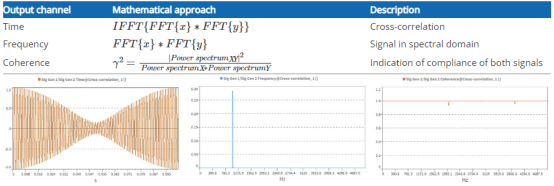
Cepstrum
One of our upgrades is the introduction of cepstrum, a signal processing algorithm for audio and acoustic analysis introduced in the 1960s. It is an important analysis method, which is currently used in many applications such as machine vibration analysis, reflection inference analysis, speech analysis or EEG and EEG analysis.
Cepstrum is a nonlinear Fourier method used to "deconvolute" two signals and serve as a tool to study the periodic structure in the spectrum. Cepstrum method has various adaptive variants. We have achieved the following three:

*DMD file compression
With the new update, we further introduced a *. dmd file compression. So far, the recorded * can be compressed. Dmd files are reduced by 30%, saving a lot of storage space. Compression is enabled by default and is performed during recording. A small change has brought great benefits!
Welcome interface
In order to make it easier for newcomers to contact OXYGEN, we introduce the "Welcome Journey" - a simple quick start guide to help you get started. It will guide you through the first post installation step and introduce you to important features. Automatically starts when using OXYGEN. If you skip it for the first time or want to refresh your knowledge, you can call it again at any time with the button.
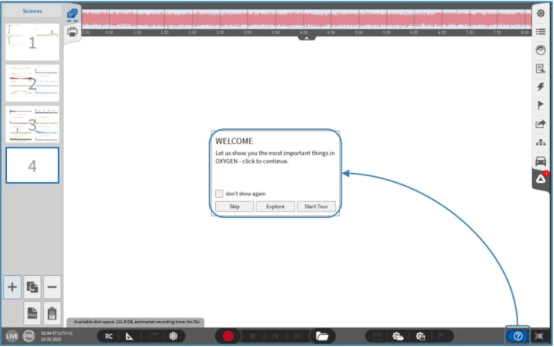
New EXCEL export
In OXYGEN 6.5, we also updated the export function of EXCEL. The new EXCEL exporter provides an overall improved output structure. Here are the key points:
Better compatibility with array channels and single valued channels
Each array channel is exported on a separate worksheet
Waveforms and statistics are in separate tables
If you prefer the previous export function, don't worry! The "old" export function is still available, but please note that maintenance will stop.
Improve operation experience
In this section, we will now introduce small but valuable improvements to OXGYEN. Importantly, these changes make working with OXYGEN easier and more comfortable!
Record cursor value
You can now copy your data record cursor values with one click.
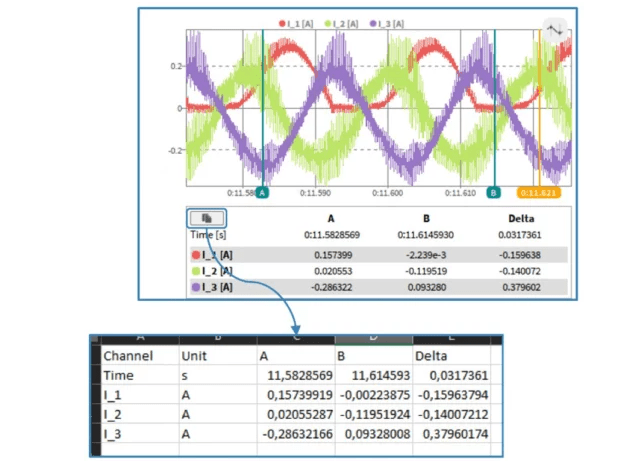
OXYGEN6.5 - Cursor value
New trigger action
We have added the Arm measurement trigger as a further trigger action type. It allows you to automatically arm to activate other triggering actions. After the trigger conditions are met, event driven recording is enabled, and recording is started and paused according to the defined trigger events.
Enhanced pre trigger time
We have increased the maximum pre trigger time to 500 seconds.
FIR filter
It is now possible to detect whether the input signal is saturated. When the input signal is saturated, the output signal is set to NaN. This is an optional setting that can be turned on or off as needed.
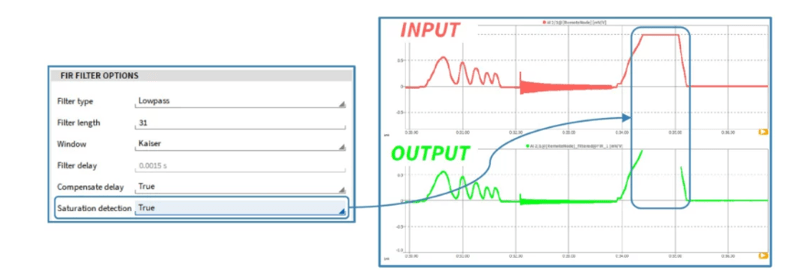
battle formations
This small upgrade allows you to switch between the bar chart and tray chart in the array chart section.
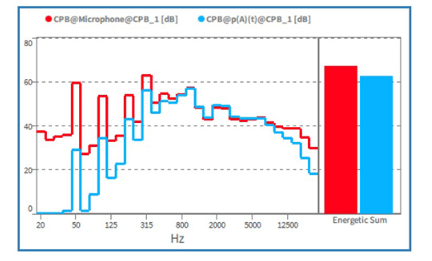
Logarithmic scale
You can now switch to log y-axis scaling by checking a box.
AVG and ACRMS calibration
AVG and ACRMS calibration can now be used for multiple channels. Simply select the required channels that must be calibrated for AVG and ACRMS. The calibration is then automatically completed separately for each channel.
Ethernet receiver plug-in
We have extended the Ethernet receiver plug-in in OXYGEN to receive and process multicast messages.
Edit Data File
We added the possibility of modifying channel names and hardware channel units.
Chassis controller update
In addition, we have implemented the following updates on the chassis controller:
Chassis controller and timing board can be selected as synchronization source
Frequency output of camera trigger on chassis controller
IRIG B DC signal can be output on the chassis controller
TRION3-1802/1600 dLV (- CAN) support (data transmission rate up to 1 GB/s)















